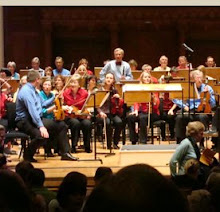The new chief executive appointed to head Creative Scotland, formerly the Scottish Arts Council, is not Scottish by birth but has spent a total of 138 days in this country, demonstrating ample enthusiasm for its culture. It is Andrew Dixon’s love of the arts that qualifies him for the exciting task ahead, and it scarcely matters that he has made his professional mark outside of Scotland.
The cultural community tends to seek its visionaries beyond the normal boundaries, thus a New Zealander leads Scottish Opera, a Frenchman drives the Royal Scottish National Orchestra and an Australian is the current brains behind the Edinburgh International Festival.
It is a trend that chimes with the RTO, which has brought international flavours into its Scottish mix with (to mention but a few) an Antipodean chairperson and first trumpet, a Californian flautist, and German, Franco Hungarian and Kiwi violinists.
A passion for the arts is the only criteria relevant to any arts organisation, the RTO included. That is all that was required way back when the orchestra’s guiding light was hired, though Sir Richard of course is blessed with many attributes.
Sir Richard, who is English, did not look for the musical directorship of the RTO. He was not a self-referring applicant. The orchestra had to go out there and find him. As one leading arts commentator said, the kind of person and personality required for this absolutely pivotal role is not likely to list sending for application forms as his or her hobby.
Unlike the boss of Creative Scotland, Sir Richard did not have to go through the Office of the Commissioner for Public Appointments in Scotland (Ocpas), the quango deployed to ensure a candidate’s competence and screen out any nepotism. The RTO recruitment process is slightly more random.
But once identified and wooed, Sir Richard proved more than up to the challenge of meshing the early RTOers into an incredible band. It is to his credit that they have grown even more incredible with the passing of time.
Which brings us, via the scenic route, to the Cramond Association. It is not every conductor of international repute who is invited to speak at the Cramond Association. In fact, Sir Richard may well have been the first. But when he addressed a record crowd last month, packed into the Association’s Millennium Room, everyone present agreed it was A Night to Remember (as was the sinking of the Titanic).
The Association’s President, George Reid, said Sir Richard ‘gave a fascinating and humorous account of the origins and development of the orchestra’. His talk was interspersed with music from orchestra members, but otherwise it was a very enjoyable evening.
What Mr Reid didn’t realise, though, is that minutes before he was due to speak, Sir Richard discovered he had lost his notes. This catastrophe might have flayed a less versatile performer but with his many years’ experience in the RTO, the maestro was quite at ease without notes. And the fact that the self-selected musicians (mostly trumpets) present didn’t bother with notes either made the whole thing look and sound completely unrehearsed!
Following the event at Cramond, other RTO players have been forming small groups and will be making themselves available for appearances at functions throughout Scotland, and abroad if called (and paid) for.
There is even a rumour, so far unconfirmed, that the RTO string trio, last heard at the Christmas 2007 Concert, will be released (on licence) for a one-off date. Please contact the website for further details.
Wednesday, 17 February 2010
Subscribe to:
Post Comments (Atom)

No comments:
Post a Comment